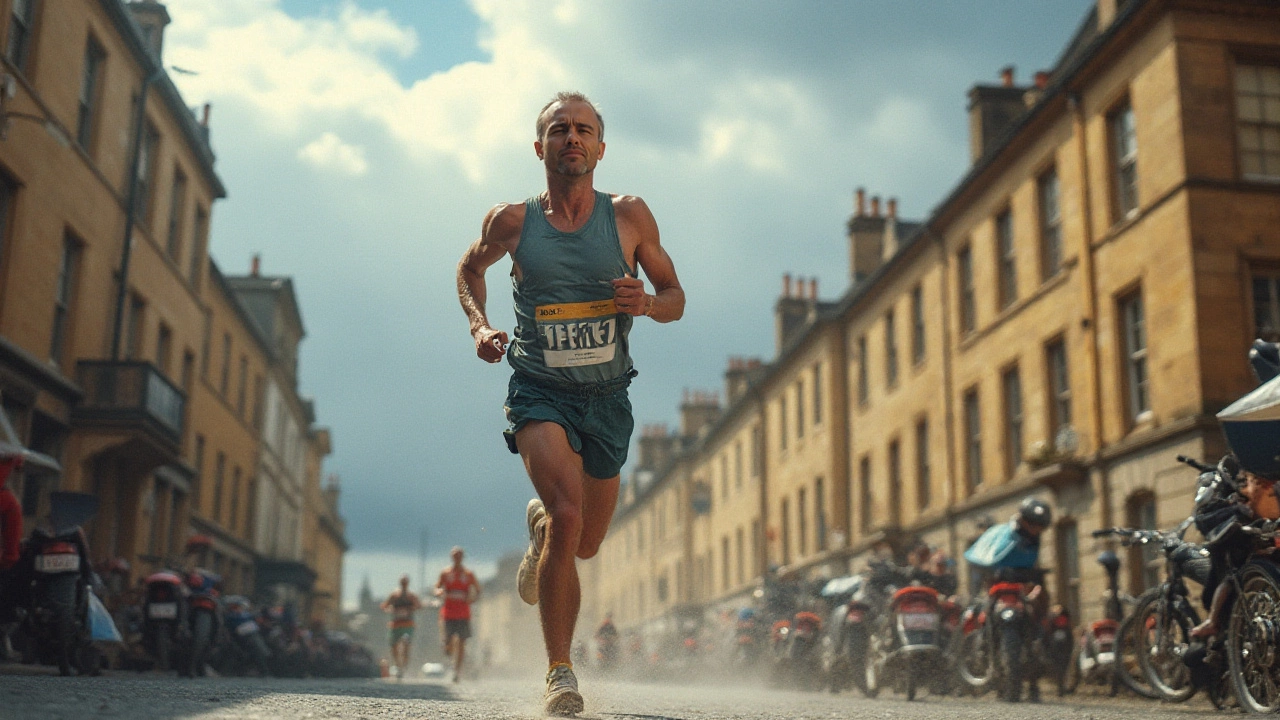Achieve Your Best Marathon Time: A Realistic Guide
Marathon running is not just about crossing the finish line; it's about understanding your potential and reaching new personal heights. Whether you're a first-time runner or a seasoned marathoner, setting a realistic time goal can make the experience far more rewarding.
In the world of marathon training, one size doesn't fit all. Many aspects contribute to the final outcome, and exploring these can help set achievable expectations. From the early days of training to the long-awaited race day, every step is an opportunity to learn and adapt.
This guide offers a deep dive into what affects marathon times and how you can set your goals. Explore tips and strategies that are not only practical but also tailored to fit your running journey. As you lace up those shoes and prepare to hit the pavement, this knowledge will be your trusted companion towards achieving your personal best.
- Factors Affecting Marathon Times
- Setting Personal Goals
- Training Strategies
- Pro Tips for Race Day
- Evaluating Your Performance
Factors Affecting Marathon Times
Chasing a goal in marathon running is like piecing together a puzzle, with each piece representing a different factor that can change your finish time. One major element to consider is your training intensity. It is no secret that runners who consistently train with dedication, mixing intensity with mileage, often see significant improvements in their marathon results. Unlike a leisurely jog in the park, marathon training requires a structured approach. This might include interval training to improve speed and long runs designed to build endurance, all tailored to suit one’s unique running prowess. Missing a beat or a run may set back progress, so keep tabs on your commitment.
Weather conditions are another piece of the marathon puzzle. Consider the temperature, humidity, and wind during race day. Cooler climates usually benefit runners, allowing them to exert energy more efficiently and prevent overheating. A surprising windy day might slow runners down, whereas mild conditions can provide that extra breeze to maintain pace. Much like the famous Boston Marathon, notorious for weather unpredictability, understanding and adjusting to these elements can be a game-changer. Juggling these conditions before and during the race can enhance performance considerably.
Your personal health and fitness levels also play a significant role. A well-balanced diet, proper hydration, and adequate rest are non-negotiable. Think of your body as a machine—feed it the right fuel, and it performs better. Note that physical well-being is closely tied with mental strength; the age-old PC phrase, "mind over matter," applies. Mental resilience can help power through difficult miles when fatigue sinks in. Consider adopting mindfulness or meditation techniques that may clear mental barriers, enabling you to conquer the proverbial wall every marathoner encounters.
Individual goals add a personal layer to the factors impacting your marathon time. Each runner's definition of success varies—some aim for a competitive edge, others for personal victories like a sub-4 hour race. It’s crucial to establish these aspirations early, shaping your training regime and channeling your efforts into areas that facilitate them. Local legend and multiple marathon winner, Des Linden, once said, "Keep showing up," emphasizing commitment's impact on results. Developing personalized strategies for marathon preparation might lead you closer to ticking off that marathon goal.
The course's difficulty and your preparation for it mustn’t be overlooked. Some marathons are known for hilly terrains while others promise a flat stretch. Each course comes with distinct challenges requiring specific preparation. Practices such as hill workouts may aid those tackling incline-heavy marathons. Understanding the course layout ahead of time, perhaps through a practice run, can uncover surprises like tight turns or varying surfaces. Too often, unfamiliar elements interfere with pacing strategy, so it’s wise to learn and prepare as much about the course beforehand.
Lastly, race day equipment and attire can't be underestimated. Selecting the right pair of shoes and apparel suitable for specific weather conditions contributes a lot to comfort and efficiency during the run. Gear should be tested thoroughly during training to avoid any unexpected discomforts on the big day. Keep in mind that personal preferences regarding attire can make or break your focus. Whether it’s the material of your shirt or the type of energy gels used, minimizing distractions counts as a factor deserving attention.
Setting Personal Goals
Embarking on a marathon journey means setting personal goals that resonate with both your heart and your abilities. The process of deciding what's realistic involves reflection on your current fitness levels, your prior running experience, and your intended purpose for pursuing marathon training. Some runners dream of achieving a particular time, others desire to complete the race comfortably, and then there are those who view the marathon as a stepping stone to greater adventures. Regardless of where you stand, it's essential to establish goals that are both ambitious and attainable.
An effective approach is to consider a range of goals categorized as 'must reach', 'would be happy with', and 'pie-in-the-sky' dreams. This method enables you to have a series of benchmarks, yet the pressure diminishes since there's a mindset that allows growth and progression. Aiming for a specific time could lead to unnecessary stress, especially for beginners. Instead, focus on completing each mile with strength and stability.
Remember, personal goals should overlay your intrinsic motivations. Dr. Peter Attia, a renowned endurance athlete, once said,
Running is not about crossing a finish line; it's about what you discover along the way.This insight invites you to self-reflect on what running truly means for you and instills discipline and courage to push through when training becomes intense.
Additionally, using data derived from your training can offer a practical edge when setting goals. If you have been charting your progress, use this data to analyze trends in performance, pace stability, and endurance levels. Data-driven goals embrace the rational side of running and equip you with a strategic plan to achieve them.
For those detail-oriented folks, visualizing goal-setting can be inspiring. Consider creating a vision board with quotes, milestones, and targets; it becomes a daily incentive. Also, don't overlook the psychological aspects—positive affirmations and mental preparation are as important as the physical regimen.
Leveraging Community Support
Lastly, engage with local running communities or online platforms where marathon enthusiasts share stories, tips, and encouragements. Sharing the journey with others can forge connections that enhance your determination. Not only does such interaction provide mutual support, but it also embeds you within a circle of individuals who understand both the trials and triumphs of pursuing marathon training.

Training Strategies
Embarking on a marathon training journey requires more than just physical preparation; it demands mental resilience and a well-structured plan. It's essential to create a base of steady mileage before diving into more challenging workouts. Ideally, this base should consist of at least 3-4 months of regular running. During this period, gradually increase your distance by no more than 10% each week to avoid injuries and to allow your body to adapt to the new demands. By focusing on consistency, runners can build the endurance needed for the longer miles they’ll encounter in later stages of training.
Once a solid mileage base is established, incorporate various running workouts to target different aspects of fitness. Long runs, often performed weekly, are a cornerstone of marathon training. They fortify cardiovascular endurance and train the mind for the marathon's expansive distance. Tempo runs are another critical component, helping to improve lactate threshold and running economy. These should be run at a comfortably hard pace, typically around your 10K pace. Interval training, featuring repeated short, intense efforts followed by recovery periods, enhances speed and running efficiency.
Complementing these running sessions with strength training has shown to significantly reduce the risk of injury and improve overall performance. A well-rounded strength program focuses on major muscle groups, especially the core, hips, and legs. Two to three sessions per week can help promote muscle balance and stability, essential for the long-haul of a marathon. Cross-training, including activities like cycling or swimming, can offer a cardiovascular boost while giving running muscles a break.
Nutrition and Hydration
Fueling your body properly before, during, and after runs can dramatically impact training effectiveness. Prioritize a balanced diet rich in carbohydrates, proteins, and healthy fats to meet your energy needs. Hydration should not be taken lightly, as even mild dehydration can impair performance. Consume enough water each day and learn to hydrate during runs, especially longer ones. Practice consuming energy gels, chews, or drinks during your training sessions to determine what best suits your stomach and energy demands.
Monitoring and adjusting your plan based on progress and how your body feels is crucial. Too often, runners fall into the trap of overtraining, which can lead to burnout or injury. Pay attention to signals such as prolonged soreness, decreased performance, or lack of motivation, all signs that you might need to dial back.
| Type of Run | Purpose | Frequency |
|---|---|---|
| Long Run | Build endurance | 1 per week |
| Tempo Run | Improve lactate threshold | 1 per week |
| Interval Training | Increase speed | 1-2 per week |
Lastly, aim to include days of rest or active recovery. These are vital for muscle repair and mental relaxation. A comprehensive training regimen that balances intensity and rest, while addressing the unique requirements of marathon running goals, positions you not just to finish the race, but to do so in your best possible time.
Pro Tips for Race Day
As race day approaches, many runners experience a mix of excitement and anxiety. The culmination of weeks or even months of marathon training hinges on this one day, and knowing how to handle it can make all the difference. The night before, ensure you have a light and carbohydrate-rich meal to fuel your body without overloading it. Aim for a good night’s sleep, although pre-race nerves might keep you awake longer than usual.
Come morning, start with a breakfast you know well – nothing new or experimental that could unsettle your stomach. Plan to arrive at the race location early, allowing you time to settle, warm up, and find your bearings. This helps reduce stress and allows you to focus on your pre-race routine. Many seasoned runners suggest a brief dynamic stretching routine to limber up and get the blood flowing.
"The best runners in the world are not those who never expense challenges; they are those who embrace difficulties and learn from them." - Eliud Kipchoge
When lining up at the start, remember the excitement can push you to start too fast. Staying within your planned pace prevents early exhaustion. Employ devices like GPS watches to track your pace, ensuring you stick to your strategy. Joining a pacing group can also keep you afloat on a steady rhythm aimed at reaching your desired marathon time. And always, hydrate as required but avoid the temptation to drink excessively; follow your individualized hydration plan.
Throughout the race, listen to your body. Pain and fatigue are natural, but understanding the difference between pushing beyond limits and risking injury is crucial. Observing other runners can provide motivation, but avoid comparisons that can discourage or derail your goal. Use positive affirmations or a mantra to stay focused, bolstering mental strength to complement your physical prowess.
One often-overlooked aspect is managing the mental game of the marathon. Psychologists suggest visualizing success and recalling your training's high points during difficult stretches. If you start feeling overwhelmed, breaking the race into smaller sections can help. Focus on reaching the next aid station or kilometer rather than the finish line perceived as a distant dot. Celebrating small achievements can substantially boost confidence during the event.
As you near the finish, expect a boost in adrenaline coupled with cheers from the crowd. Let this encourage you, but remain cautious in expending energy too rapidly. A controlled final sprint can feel euphoric, yet don’t forget your body’s capacity. Crossing the finish line is a triumph, a testament to your hard work and dedication. Post-race recovery is equally vital; gentle stretches and proper nutrition begin your body's regeneration after such a taxing event. Hydration, protein intake, and a bit of rest lay the groundwork for bouncing back stronger.

Evaluating Your Performance
Finishing a marathon, regardless of the time, is an achievement worthy of celebration, but analyzing your run can reveal insights for future improvement. As you cross that glorious finish line, you turn a page in your marathon training journey, where the narrative now shifts towards understanding and enhancing your performance. Accurate assessment involves more than just noting your marathon time; it encompasses various dimensions such as pacing strategies, nutrition, and mental focus throughout the race.
Start by breaking down different segments of the race. Did you maintain a steady pace, or was there notable variance? Analyzing your pace graph may identify points of burnout or instances where you could have pushed harder. Apps and smartwatches can offer this data, highlighting how consistent your runs were across different weather conditions and terrain types. Additionally, reflecting on your nutritional intake—before and during the race—could shine a light on how certain foods impact your energy levels.
Talking to those who have successfully reached their running goals can be a valuable resource. Sharing experiences with fellow runners not only offers communal support but also inspires fresh perspectives.
"Evaluating a race involves combining personal reflection with expert advice," said renowned coach Jeff Galloway. "Only by understanding the 'why' behind each decision and its outcome can we truly grow as runners."His words suggest the importance of blending personal experience with guidance from respected figures in the running community.
Technological advances now allow a detailed scrutiny of marathon performances. Considering these insights, how do you measure the influence of technology on your running capacity? Check if your device offers real-time data like cadence and heart rate, which can serve as indicators of your overall fitness level during the race. Is there a correlation between these factors and your training regimen's intensity? If so, adjusting your routine might be beneficial.
Performing a thorough post-race assessment may seem daunting, but it provides a roadmap for future races. Make it a routine to document each marathon experience. Analyze your physical and emotional states at different checkpoints. Track environmental conditions, your mood on race day, and any hurdles you faced unexpectedly. These reflections can gradually build a profile guide for what brings out the best in you during a marathon.
Ending our discourse with numbers, let’s dive into some statistics that reflect average marathon times globally. The worldwide average marathon finish time is about 4 hours and 32 minutes, though it varies based on demographic factors such as age, gender, and prior experience. Most elite runners aim for sub-3-hour times, illustrating that performance assessment is a critical tool regardless of your expertise level.









